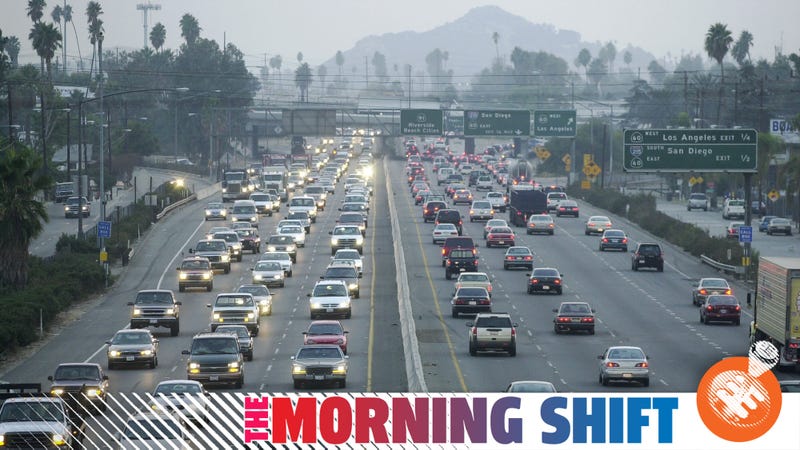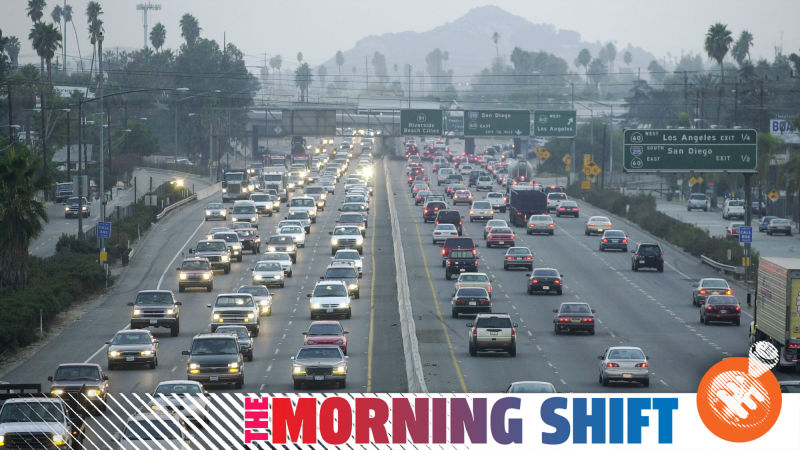
 The Morning ShiftAll your daily car news in one convenient place. Isn’t your time more important?
The Morning ShiftAll your daily car news in one convenient place. Isn’t your time more important? President Donald Trump is officially waging legal war against California over vehicle emissions, the other war (trade war) is forever, General Motors may have screwed Ford and Fiat Chrysler, and so much more going on in The Morning Shift for Thursday, September 19, 2019.
1st Gear: Trump Hates States’ Rights When The State Is California
The Trump Administration is legally challenging California’s ability to establish its own regulations for vehicle emissions, following months of threats and back and forth over the federal government attempting to scale back the Obama administration’s 2025 emissions goals. The announcement was expected but made official yesterday.
Advertisement
With this move, the White House seeks to unify emissions under one national standard, and not effectively two. California has the ability to set its own standards and 13 other states follow suit.
More from Reuters:
Environmental Protection Agency (EPA) Administrator Andrew Wheeler said in a statement the decision will ensure nationwide rules that provide “much-needed regulatory certainty for the automotive industry.” Currently, California’s more stringent vehicle emissions rules are also followed by a dozen other states that account for than 40% of U.S. vehicle sales.
“No state has the authority to opt out of the nation’s rules and no state has the right to impose its policies on everybody else in our whole country,” Transportation Secretary Elaine Chao said at a press conference. “To do otherwise harms consumers and damages the American economy.”
[…]
In a joint statement with the EPA, the Department of Transportation’s National Highway Traffic Safety Administration said it is affirming that federal law preempts state and local regulation of vehicle fuel economy.
Advertisement
But the Trump administration’s framing is inherently flawed. California isn’t opting out of the federal rules, it’s simply overachieving on the standards proposed by the Trump administration. Technically, the California compromise would meet and exceed the federal standard, so they aren’t not meeting the federal standard. The federal government also will need to provide whatever evidence it has about harming consumers or damaging the economy.
(There’s also a missing pro-states’ rights, limited federal government argument you’d expect to be made from a conservative administration, but whatever.)
Advertisement
Anyway, what’s interesting, at least within these first 24 hours of it officially being a legal question now, is that automakers didn’t immediately come out in full force against the federal government’s challenge to California’s authority. Also from that story:
While worried that California’s electric vehicle mandates will be costly, global automakers have little choice but to develop battery electric cars and trucks because Europe and China are pushing ahead with rules requiring them.
The Alliance of Automobile Manufacturers, a trade group representing General Motors Co (GM.N), Toyota Motor Corp (7203.T), Volkswagen AG (VOWG_p.DE), Ford Motor Co (F.N) and others, declined on Wednesday to take a position on Trump’s revocation of California’s waiver.
Advertisement
You would think automakers would be quick to take a position because they genuinely don’t have much of a choice. Ideally they want one standard, as it’s easier to meet, but earlier this year several automakers made a compromise with California anyway.
Advertisement
A legal battle between the federal government and California will take years to sort out, the global marketplace requires the companies to invest in the research and development of more efficient vehicles regardless of any individual state or federal government may want.
To not have a statement prepared for a legal showdown that was inevitable is likely an attempt to avoid public blowback from a president who tweets a lot, but it’s cowardly and ultimately counterproductive to let the debate be governed by the two governments, when even just a handful of automakers in the market could be able to influence public and political opinion given that they are, you know, a huge foundation of the American economy and ultimately are going to have to make more efficient cars regardless.
Advertisement
2nd Gear: Democrats Ain’t Buying It
Meanwhile, the Senate’s antitrust subcommittee grilled some folks about an investigation into California’s tentative compromise agreement with four automakers concerning the state’s emissions regulations, which is being led by the Justice Department.
Advertisement
As I mentioned earlier, Ford, Honda, BMW and Volkswagen all agreed to a compromise deal with California to essentially delay the Obama administration’s 2025 emissions goals to 2026. Again, this wouldn’t necessarily violate any change to federal standards, just exceed them.
But the investigation is a very transparent attempt by the federal government to intimidate the companies directly down range of the changes both California and the federal government are attempting to make from having a voice in the conversation. From Automotive News:
Asked by Connecticut Sen. Richard Blumenthal about the basis for the probe, Delrahim acknowledged that companies are free to discuss a policy position and petition government agencies, but said it is a violation “when there’s collusive activity.”
In a testy exchange, Sheldon Whitehouse, a Rhode Island Democrat and former prosecutor, asked whether Delrahim had any evidence that the automakers had made any agreements related to vehicle pricing, to which Delrahim said he did not.
Given the broader conflict over the Trump administration’s plan to ease emissions standards and the reluctance of automakers to support it, “it looks an awful lot like scores are being settled here, and God forbid that the Department of Justice should ever become the tool for political scores to be settled,” Whitehouse said.
Delrahim replied, “I agree with you on that senator, and that’s not what’s going on here.”
Advertisement
It’s going to be hard to make any arguments about antitrust against the automakers if this has nothing to do with price fixing or anything of the sort, and is instead simply an effort by powerful players in the market to stabilize expectations and settle on a clear, reasonable and rational goal for standards so they can map out their futures with some degree of security, like a healthy business seeking a healthy economy.
3rd Gear: GM Just Put Ford And FCA In A Tough Spot
GM’s stalemate with UAW negotiators, which led to a massive worker strike of its employees, has now put Ford and Fiat Chrysler on notice as they prepare for their own union deliberations. From Automotive News:
Advertisement
GM’s turnabout on health costs still wasn’t enough to ward off a walkout by 46,000 GM employees. The episode is a bad omen for Fiat Chrysler Automobiles and Ford Motor Co., since the UAW typically tries to pattern contracts reached with the Detroit 3 after one another. Ford is expecting the insurance bill covering its 56,000 hourly workers to exceed $1 billion for the first time next year, Bloomberg News reported in March.
“Asking for 15 percent more toward the health care without handling the other issues the UAW wanted was an unusual tactic that didn’t work,” said Arthur Wheaton, director of the Worker Institute at Cornell University. “It may have actually encouraged the membership to say: ‘You know what, if they don’t want to be serious, we’ll go out on strike.’”
Health care has long been considered the third rail of automotive contract talks, with workers zealously clinging to their plans. They see them as hard-won benefits that help make up for the wage concessions and jobs given up over a decade ago when GM and Chrysler went bankrupt and Ford went through wrenching restructuring.
The three companies’ hourly employees contribute between 3 percent and 4 percent to their coverage, compared with 29 percent for the average American worker, according to a October 2018 study by the Kaiser Family Foundation.
Advertisement
Hopefully the GM strike works out soon enough, but that massive backfire likely means Ford and FCA’s union workers will have a little more leverage should their automakers try to alter their healthcare terms.
4th Gear: Trade Talks Aren’t Something That Will Settle In A Month
Last week, White House advisers asked us all to be patient given the upcoming trade talks between the U.S. and China, which will hopefully gain some ground, any progress, literally anything whatsoever, after two years of back of forth.
Advertisement
Well they’re going to need a lot more than just a month. Maybe years. And it’s going to be a series of exhausting small deals, constantly pulling us from the brink of increased tariffs and extended trade wars. Sounds like a lot of fun, from Reuters:
Trade experts, executives and government officials in both countries say that even if the September and October talks produce an interim deal that includes purchases and a reprieve for Huawei, the U.S.-China trade war has hardened into a political and ideological battle that runs far deeper than tariffs and could take years to resolve.
Jon Lieber, a principal in PwC’s national tax services practice, said a “very narrow agreement” in October would do little to solve fundamental differences between the two countries.
Advertisement
The president is going into an election having blown up a solid deal between the world’s two biggest economies, and likely won’t have a bandaid in place before facing reelection.
5th Gear: Germany Empathizes With The Companies That Fucked Up
Despite a gaggle of German (and others, but mostly German) automakers doing everything they could to dodge diesel emissions standards just a few short years ago, the German government is terrified by tanking sales in China and tanking production output of German-made cars, so now it wants to help some companies.
Advertisement
From Bloomberg:
“We want to direct the behavior of people in a certain direction,” she said. “The pricing of CO2 is the right way to make clear that all innovations should follow the goal of emitting less CO2. If we do this in a long-term and accountable way, there will be the incentives to move innovation in the right direction.”
Volkswagen AG, Daimler AG and BMW AG are facing tough times. Pollution concerns — intensified by VW’s 2015 diesel-cheating scandal — have tarnished the industry’s image and triggered massive investment in electric vehicles. Those costs had already started squeezing earnings when almost a decade of uninterrupted industry growth led by China came to a halt. The consequence is Germany’s car production slumping to the lowest level since at least 2010.
Advertisement
I understand a need to motivate consumers to purchase newer vehicles with improved efficiency and reduced emissions, like hybrids and battery-electric cars, but dumping the cost of that change on an emissions tax has the potential to unfairly impact commuters who can’t exactly afford to go out and buy a new car.
So, instead of doing more to incentivize cheapening the cost of these new technologies, Germany is considering financially punishing those that don’t commit to the cost. Not sure that’s the smart game plan, especially if you’re worried about an unstable economy. I understand the pressure to do something to curb emissions, but maybe punishing the little guy isn’t the way to go.
Advertisement
Reverse: Hot Air For The King
Advertisement
Neutral: How Do You Feel About A Carbon Tax?
To be fair, Germany’s plans aren’t even plans yet, just suggestions and ideas. But is there any form of emissions taxes in the U.S. you would be comfortable paying? Perhaps if it was designed to disproportionately target larger, beefier cars and not just kick every Civic owner’s ass?













